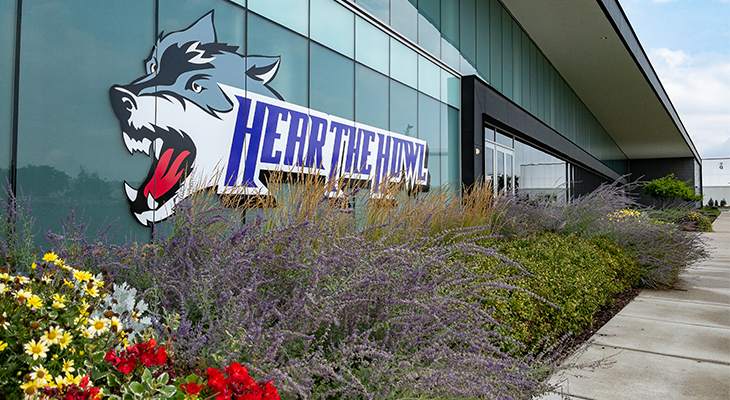
JJC Wolves Basketball vs. Kankakee Community College
On Monday, April 8, Joliet Junior College (JJC) will provide the community an opportunity to safely view the partial solar eclipse from outside of the Event Center on Main Campus, 1215 Houbolt Rd. in Joliet, Illinois.
The JJC solar viewing event will begin at 12:30 p.m. and conclude at 2:30 p.m. The eclipse will begin at 12:51 p.m., reach its maximum at 2:06 p.m. and end at 3:21 p.m. The moon will obscure 94.2% of the sun’s disk at maximum eclipse.
A limited number of solar eclipse viewers will be available. Guests will also be able to view projected images of the sun using Sunspotter telescopes and Sun Funnel on an 8-inch telescope. In addition, a specialized solar telescope will be available to view solar prominences.
A LightSound device attached to a loudspeaker will be available for blind and visually impaired guests to experience the eclipse via sound. As the intensity of sunlight changes during the eclipse, the musical tone output by the device will change.
While we will see a deep partial solar eclipse from Joliet, people in parts of western and north-eastern Mexico, parts of southern and midwestern USA (including southern Illinois), and eastern Canada will experience a total solar eclipse in a path that is 115 miles wide. During totality, the sun will be completely covered by the moon for up to 4 minutes and 28 seconds. NASA’s live-feed of the total solar eclipse will be played in the Event Center (EC-1000 and 1001) during the event.
Attendees are welcome to bring their own food and drink to this free event. The Event Center's concessions stand will be also be open. Service animals are permitted, but pets are not allowed. Restrooms will be available inside the Event Center. In the event of rain or clouds, the event will move indoors to the Event Center. More information is available visiting jjc.edu or by contacting professor Noella Dcruz at ndcruz@jjc.edu
Most of the funding for this event has been provided by the Award for Innovation and Excellence grant from the JJC Foundation to astronomy professor Noella Dcruz. The Natural Sciences Department also provided support.
CAUTION: Do NOT look at the sun directly with the unaided eye, or through a telescope or binoculars that do not have a reliable, correctly fitted solar filter. This could cause permanent eye damage, including blindness.

